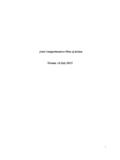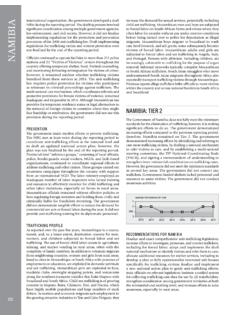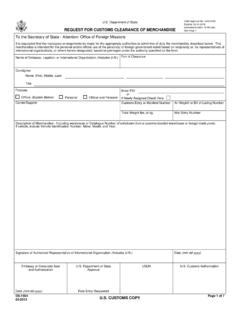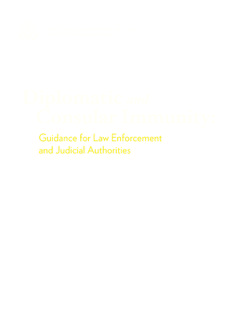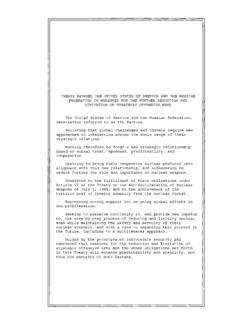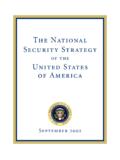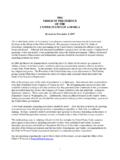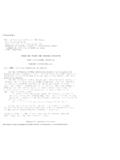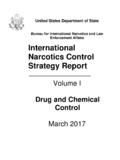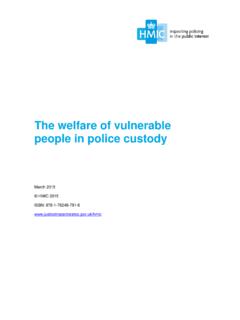Transcription of INDIA 2020 HUMAN RIGHTS REPORT - U.S. Department of …
1 INDIA 2020 HUMAN RIGHTS REPORT EXECUTIVE SUMMARY INDIA is a multiparty, federal, parliamentary democracy with a bicameral legislature. The president, elected by an electoral college composed of the state assemblies and parliament, is the head of state, and the prime minister is the head of government. Under the constitution, the country s 28 states and eight union territories have a high degree of autonomy and have primary responsibility for law and order. Electors chose President Ram Nath Kovind in 2017 to serve a five-year term, and Narendra Modi became prime minister for the second time following the victory of the National Democratic Alliance coalition led by the Bharatiya Janata Party in the 2019 general election.
2 Observers considered the parliamentary elections, which included more than 600 million voters, to be free and fair, although there were reports of isolated instances of violence. The states and union territories have primary responsibility for maintaining law and order, with policy oversight from the central government. police are under state jurisdiction. The Ministry of Home Affairs controls most paramilitary forces, the internal intelligence bureaus and national law enforcement agencies, and provides training for senior officials from state police forces. Civilian authorities maintained effective control over the security forces.
3 Members of the security forces committed some abuses. Significant HUMAN RIGHTS issues included: unlawful and arbitrary killings, including extrajudicial killings perpetrated by police ; torture and cases of cruel, inhuman, or degrading treatment or punishment by some police and prison officials; arbitrary arrest and detention by government authorities; harsh and life-threatening prison conditions; political prisoners or detainees in certain states; restrictions on freedom of expression and the press, including violence, threats of violence, or unjustified arrests or prosecutions against journalists, use of criminal libel laws to prosecute social media speech, censorship, and site blocking; overly restrictive rules on nongovernmental organizations; restrictions on political participation; widespread corruption at all levels in the government; lack of investigation of and accountability for violence against women; tolerance of violations of religious freedom.
4 Crimes involving violence and discrimination targeting members of minority groups including women based on religious affiliation or social status ; and forced and compulsory child labor, as well as bonded labor. 2 INDIA Despite government efforts to address abuses, a lack of accountability for official misconduct persisted at all levels of government, contributing to widespread impunity. Investigations and prosecutions of individual cases took place, but lax enforcement, a shortage of trained police officers, and an overburdened and underresourced court system contributed to a low number of convictions.
5 Separatist insurgents and terrorists in the Union Territory of Jammu and Kashmir, the Northeast, and Maoist-affected areas committed serious abuses, including killings and torture of armed forces personnel, police , government officials, and civilians, and recruitment and use of child soldiers. The government continued taking steps to restore normalcy in Jammu and Kashmir by gradually lifting some security and communications restrictions. The government released most political activists from detention. In January the government partially restored internet access; however, high-speed 4G mobile internet remained restricted in most parts of Jammu and Kashmir.
6 The government began a process to redraw electoral constituencies but did not announce a timeline for local assembly elections. Local district development council elections took place in December in which a coalition of Kashmiri opposition parties won the majority of seats. Section 1. Respect for the Integrity of the Person, Including Freedom from: a. Arbitrary Deprivation of Life and Other Unlawful or Politically Motivated Killings There were reports that the government or its agents committed arbitrary or unlawful killings, including extrajudicial killings of suspected criminals and insurgents. Military courts are primarily responsible for investigating killings by security forces and paramilitary forces.
7 Reports of custodial death cases, in which prisoners or detainees were killed or died in police and judicial custody, continued. In June the National Campaign against Torture reported the deaths of 125 persons in police custody in 2019. The REPORT stated 74 percent of the deaths were due to alleged torture or foul play, while 19 percent occurred under suspicious circumstances. Of the 125 deaths in police custody, Uttar Pradesh reported the highest number at 14, followed by Tamil Nadu and Punjab with 11 deaths each. The 125 deaths in police custody documented by Country Reports on HUMAN RIGHTS Practices for 2020 United States Department of State Bureau of Democracy, HUMAN RIGHTS and Labor 3 INDIA the National Campaign against Torture in 2019 included 13 victims from Dalit and tribal communities and 15 Muslims.
8 On June 23, Ponraj Jeyaraj and his son, Beniks Jeyaraj, died while in police custody in Tamil Nadu. The two men were arrested for violating COVID-19 regulations by keeping their shop open after lockdown hours. police beat them while in custody, and they subsequently died from their injuries while in a medical facility for prisoners. State law enforcement officials arrested 10 officers involved in the detention. The Tamil Nadu state government announced it would provide two million rupees ($27,000) in financial compensation to the victims family. The case remained under investigation by the Central Bureau of Investigation (CBI) and the state government s HUMAN RIGHTS commission.
9 Nongovernmental organizations (NGOs such as Amnesty International INDIA (AII) and HUMAN RIGHTS Watch (HRW) condemned the high numbers of custodial deaths in Tamil Nadu, the second highest number in the country according to data from the National Crime Records Bureau (NCRB), and have called for accountability and investigation into these cases. In August the NCRB released the Prison Statistics of INDIA (PSI) 2019 REPORT , which documented 1,775 inmate deaths under judicial custody in 2019. During the COVID-19 national lockdown from March 25 to April 30, Commonwealth HUMAN RIGHTS Initiative (CHRI) compiled a list of 15 fatalities that included deaths from excessive police action such as canings and beatings.)
10 Killings by government and nongovernment forces, including insurgents and terrorists, were reported in Jammu and Kashmir, northeastern states, and Maoist-affected areas of the country (see section ). The South Asia Terrorism Portal (SATP) reported the deaths of 63 civilians, 89 security force members, and 284 insurgents countrywide as a result of terrorism or insurgency attacks. The Jammu and Kashmir Coalition of Civil Society (JKCCS) reported 229 killings in 107 incidents in the first six months of the year. JKCCS also reported 32 extrajudicial killings in the first half of the year in Jammu and Kashmir. Formal charges have yet to be filed in the 2018 killing of Rising Kashmir editor in chief Shujaat Bukhari and his two police bodyguards.
